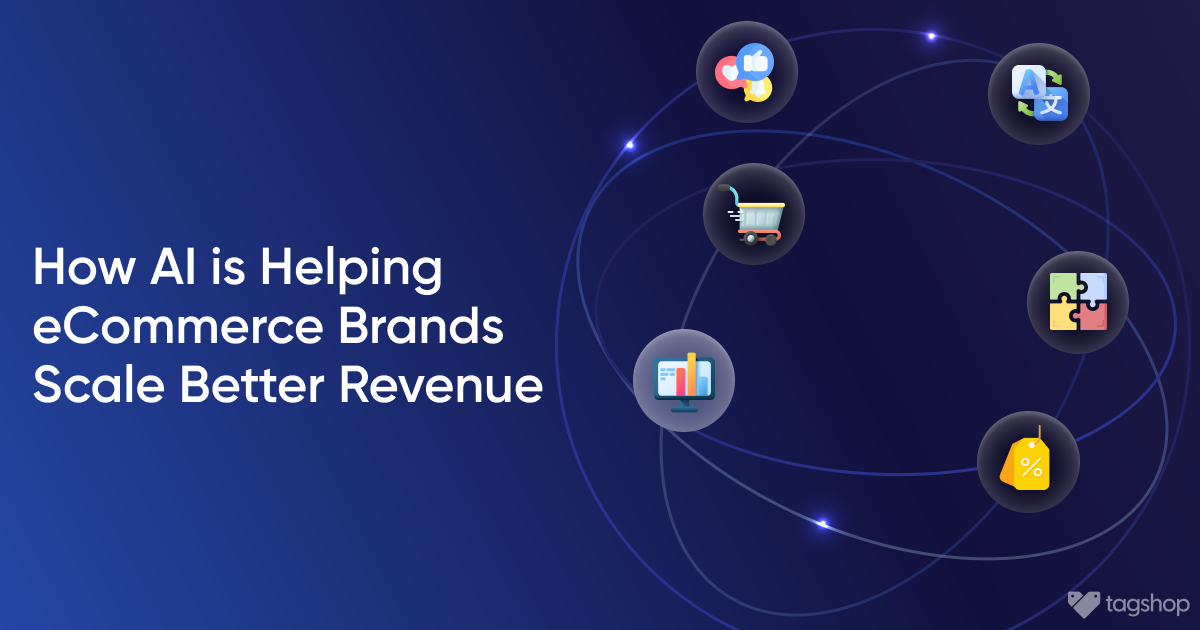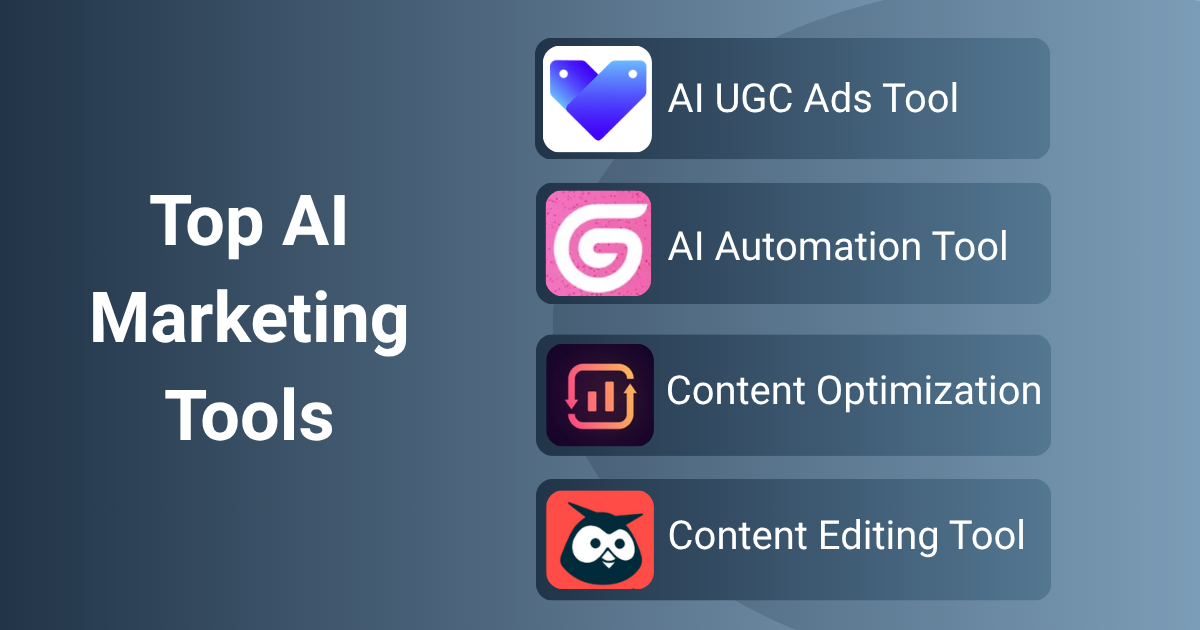AI in E-commerce: The Game-Changer Brands Need
Great inventions always have two births. The first is when the invention occurs, and the second is when it hits popularity and reaches the masses.
Artificial Intelligence (AI) is one such invention. Initially defined in 1950, it is catching its pace today. AI is unexpectedly enhancing industries, and one example of these highly affected industries is eCommerce.
‘AI in e-commerce’ is becoming a strategy that has the ability to transform the industry’s scenario.
How? In this blog, we will unwind everything, from the role and impact of AI in e-commerce to its future and benefits for the industry.
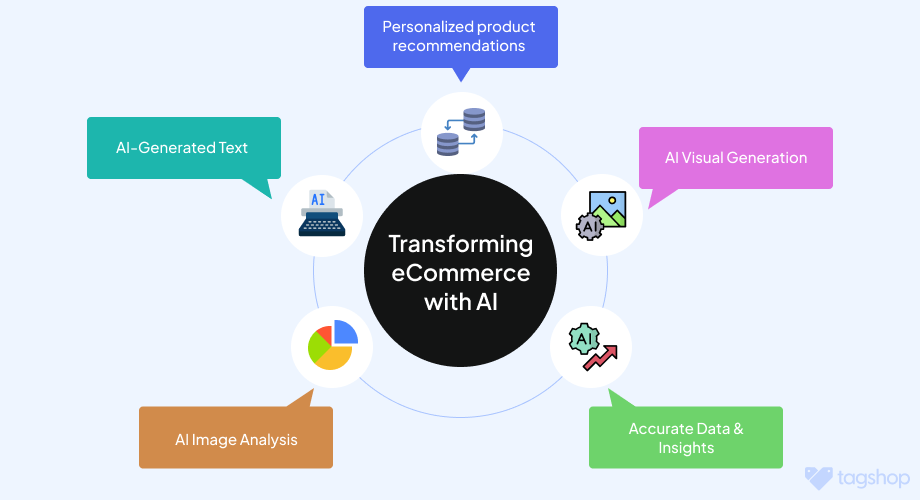
Generative AI & Its Role In Improving E-Commerce
The e-commerce industry has flourished exceptionally, from demand generation to standing in a heavily competitive market. The industry is peaking, and the only fair way to beat the competition is to stand out.
According to research by ResearchGate, by 2030, it is likely that 70% of businesses will utilize some form of artificial intelligence technology in their business processes and activities, including areas such as project management.
While traditional AI practices can be used to analyze data and perform tasks like Search Engine Optimization and algorithm development, generative AI in e-commerce can generate new content, such as graphics, text, and code.
Generative AI can also empower platforms to deliver more personalized, interactive, and seamless experiences, significantly enhancing the e-commerce customer experience in various ways. For example:
1. Enhanced Visuals
Relevant generative technologies, such as AI-generated images, videos, diffusion models, and animation software, can help businesses create high-quality visuals, videos, and 3D models. This can effectively enhance product displays, virtual showrooms, and advertising materials by utilizing a cover art maker, making them more appealing and visually engaging to customers.
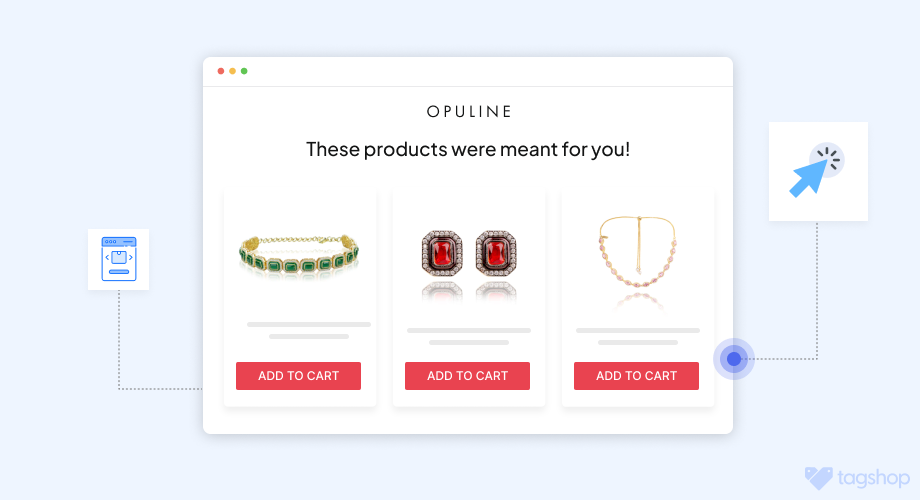
2. Personalized Product Recommendations
By analyzing customer behavior, browsing history, and purchase patterns, Generative AI can provide personalized product recommendations, increasing the chances of customers finding products that match their preferences and interests.
For those seeking alternative educational options, exploring options beyond Kumon can offer new perspectives on personalized learning paths tailored to individual needs and goals.
3. Virtual Try-Ons and Fittings
For consumer goods businesses, generative AI can allow virtual try-on experiences. With this feature, customers can see how products like clothing, accessories, or furniture would look or fit in their homes or on themselves, enhancing decision-making and reducing return rates.
4. Natural Language Product Descriptions
Generating AI is now being used in advanced tools such as text summarizers. The integration of this technology in the summarizer has enhanced its ability to generate a highly persuasive and concise version of the given product content. This means e-commerce platforms can now provide customers with to-the-point information about the products they offer, improving the overall chances of sales. AI Humanizer helps eCommerce brands turn AI content into human-like, brand-aligned, conversion-focused copy.
5. Customer Support
Generative AI is revolutionizing customer service with AI call center solutions. These AI solutions efficiently handle inquiries, process orders, and provide 24/7 support through natural, conversational interactions. By delivering instant, human-like responses, they enhance the shopping experience and improve customer satisfaction. Beyond call centers, AI for customer service in eCommerce includes chatbots, automated email responders, and virtual shopping assistants that help guide customers, answer FAQs, and personalize recommendations. These tools streamline support, reduce wait times, and create a seamless shopping experience.
How to implement AI in eCommerce
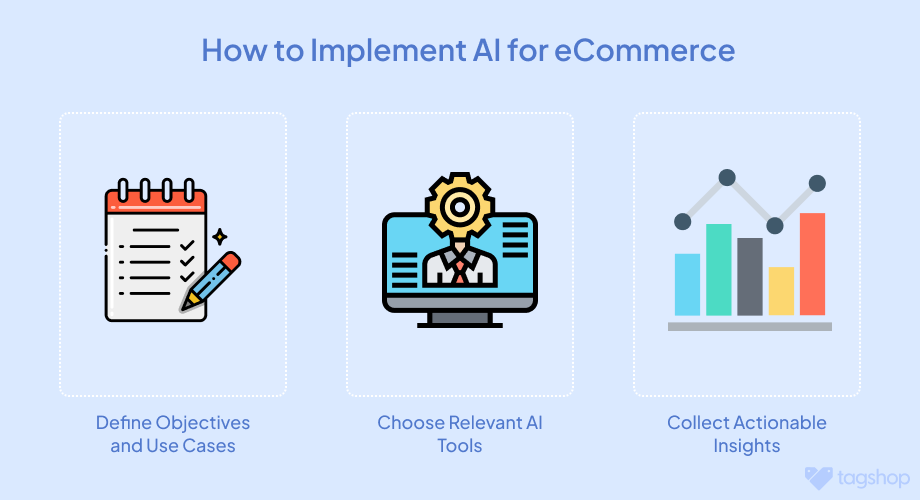
By now, you should have realized that AI in e-commerce is no longer an optional strategy, particularly with advancements in remote device management. Businesses want customers, and customers want brands that can provide a seamless shopping experience. AI can do that.
But how can e-commerce brands incorporate it into their working strategies?
Let’s find out:
1. Define Objectives and Use Cases
Identify the specific areas in your eCommerce business where AI can add value. It could be personalized recommendations, chatbots, fraud detection, inventory management, or customer service automation. Prioritize the use cases based on their potential impact and feasibility.
2. Choose Relevant AI Tools
When catering to specific industries, it is essential to select tools that can deliver value to your business and help you overcome your challenges. The best option is to invest in AI e-commerce tools that may offer solutions such as AI-powered shoppable galleries, integrating social content into websites, etc.
3. Collect Actionable Insights
AI systems rely on data to learn and make informed decisions. Perform data extraction from various sources, such as customer interactions, purchase history, or website behavior, and utilize this data to create personalized advertisements and customer recommendations. Ensuring the accuracy and availability of this data at scale can be supported by using tools for cloud monitoring, which help track data flow, system performance, and anomalies across cloud environments.
In addition, maintaining robust cloud security ensures that sensitive information remains protected during these processes, preventing unauthorized access and preserving data integrity across AI operations.
However, to fully capitalize on these benefits, businesses must first assess their AI readiness, ensuring they have the necessary infrastructure and processes in place to integrate generative AI effectively into their operations.
Implementing AI in e-commerce can be challenging, but it also presents significant opportunities for businesses to engage with their customers more effectively. Furthermore, AI in reporting enhances decision-making by delivering real-time, actionable insights into customer behavior and campaign performance. That’s not all, because AI also holds a whole trove of new possibilities that can shape the future of eCommerce in astonishing ways!
Let’s hear it.
The Future of Automation & AI in eCommerce
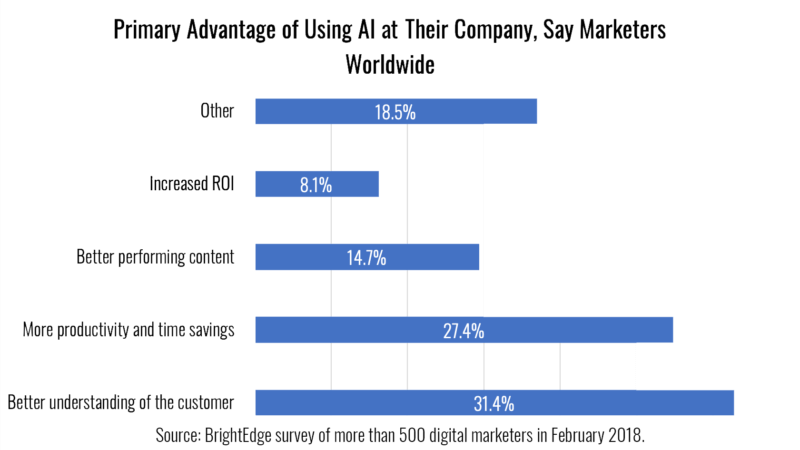
Image Credits: Search Engine Journal
It is fair to say that this era is all about transformations in the digital landscape. The things we are experiencing today as mainstream were mere ‘predictions’ in the past, including concepts like voice assistants, AI meeting assistants, smart home products, and of course, AI.
But what’s worth noticing is that the majority of these technologies use artificial intelligence. Here are some interesting stats
- Studies show that AI-enabled devices surround us at every step. Nearly 77% of devices today utilize AI technology in some form.
- The AI market is expected to reach approximately $60 billion by 2026, up from $1.4 billion in 2016.
- According to a Forbes study, AI is expected to contribute $15.7 trillion to the global economy by 2030.
- Using AI-powered tools and platforms can increase business productivity by approximately 40%.
In conclusion, the future of automation and generative AI in e-commerce holds significant promises for businesses and consumers alike. As these technologies continue to evolve and intertwine, the e-commerce landscape will witness unprecedented levels of efficiency, personalization, and innovation, redefining the way we shop and interact in the digital world.
Benefits of Artificial Intelligence in E-commerce Brands
We have discussed various possibilities and use cases of AI in e-commerce. However, implementing AI in e-commerce also has various direct benefits.
These benefits are set to revolutionize how businesses engage with customers and optimize their operations, propelling them toward unparalleled success and customer satisfaction.
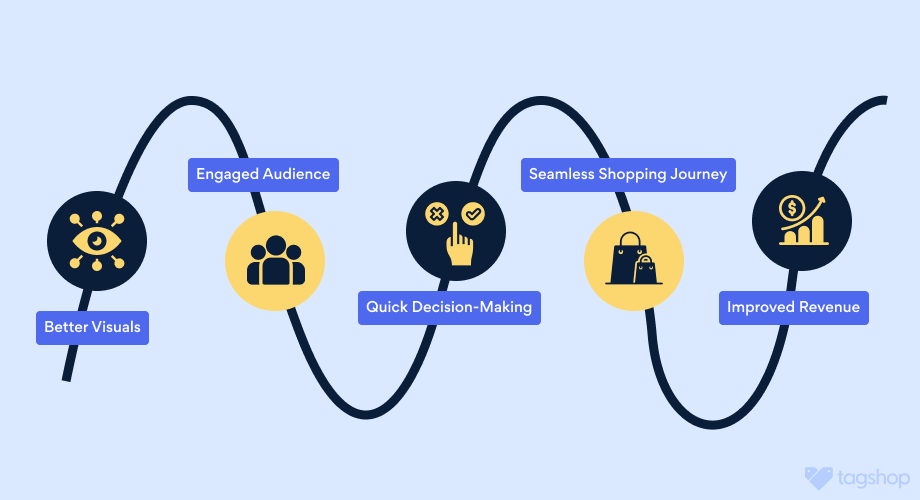
1. Improved Platform Engagement
By leveraging generative AI tools, e-commerce platforms can enhance customer engagement by creating personalized and visually appealing content that resonates with their target audience. Brands can improve their store’s product pages, create personalized ads, and even create aesthetically pleasing Instagram feeds with this content.
Additionally, platforms can also benefit from AI-driven voice commerce features that can enable seamless interactions, catering to customer preferences and driving higher sales and revenue.
2. Managing Marketing Campaigns
Marketing campaigns can be a crucial strategy for businesses looking to scale their e-commerce operations. The use of AI in marketing can help e-commerce businesses execute these campaigns, including email and influencer marketing campaigns, with high precision.
Marketing analytics tools help identify customer behavior patterns and optimize targeting and messaging. This minimizes the chances of human error in campaign management, leading to higher conversion rates and a more effective use of marketing budgets. However, you will likely still need to train your employees to effectively utilize such AI tools, whether through mentorship programs or dedicated support channels.
3. Automating Tasks To Improve Efficiency
AI features, such as chat assistants, can be great for streamlining e-commerce operations by handling repetitive tasks that require more effort and 24/7 attention. These tasks can include inventory management and customer support. With the right tools, these can be automated with efficiency.
By automating these processes, businesses not only save time but also boost overall efficiency. For instance, remote employee time‑tracking and pulse survey tools — along with workforce scheduling platforms like Homebase — enable human resources teams to focus on strategic growth initiatives, identify areas for improvement, and enhance customer service.
Integrating remote work monitoring software adds another layer of visibility, helping teams stay accountable and aligned across different locations.
This automation extends to handling complex ecommerce taxes across different jurisdictions, ensuring compliance while reducing the manual workload on finance teams.
Interestingly, similar AI-driven advancements are also shaping the future of the accounting industry, showcasing how automation is transforming various sectors.
Now, we know we have been talking too much about the ‘appropriate tools’ and the ‘right tools.’ We understand that finding tools that cater to all your brand’s requirements collectively can be challenging.
So, here are a few AI e-commerce platforms that can be useful:
Best Artificial Intelligence Tools & Platforms For E-Commerce
Here are a few top AI tools and platforms that can help eCommerce brands:
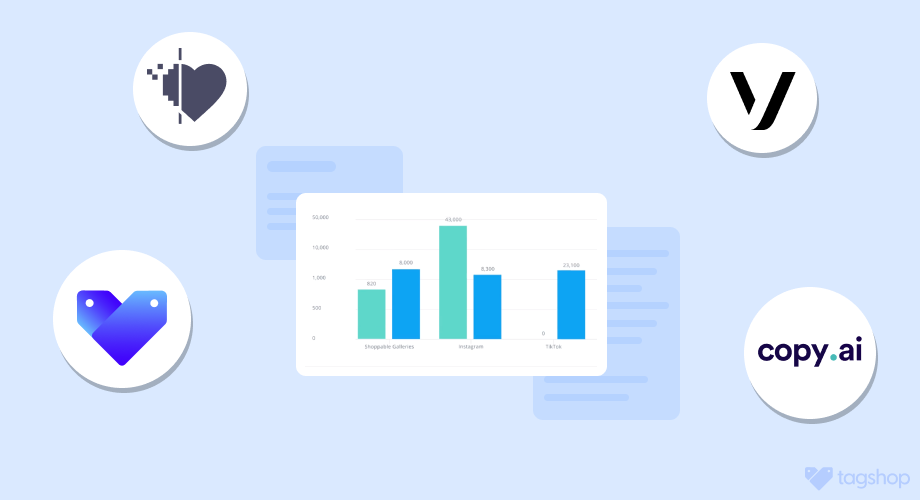
1. Tagshop AI
Tagshop AI is an AI-powered ads creation tool that helps businesses transform simple product images or scripts into engaging marketing videos. These videos feature a realistic AI avatar that closely resemble a real people, making them ideal for ad creatives, product demos, testimonials, and social media content.
2. Paraphraser.io
Paraphraser is an AI-driven tool that allows users to rephrase online and refine their content to help them ensure bespoke tone and writing style.
This tool analyzes the given content, understands its intent, recognizes pitfalls, and removes them to improve clarity and readability.
While users can leverage AI to generate content for various purposes, such as social media interactions, blog posts, product descriptions, and more, aligning it with their brand’s voice requires manual effort .
This tool allows users to bypass the need for manual input, as it refines the content, improves sentence structure, replaces complex words with simpler alternatives, and ensures bespoke tone with the help of cutting-edge algorithms.
3. Neural Love
Neural Love is a free AI image generator and enhancer dedicated to optimizing your images to meet your creative aspirations. With Neural Love, you can effortlessly transform your images, refurbishing them with artistic elements, filters, and editing options.
With this tool, you can create new images and also edit images already existing in your gallery. Upload your desired images and let Neural Love do the work, redesigning them to perfection.
4. Vonage
Vonage is a conversational e-commerce AI platform driven by innovative technology. It offers a range of communication APIs (Application Programming Interfaces) that enable businesses to integrate various communication channels, such as voice, messaging, and video, into their applications and websites.
With the tool’s AI-powered conversational features, users can enhance customer interactions and deliver personalized experiences in e-commerce.
5. Copy.ai
Copy.ai is an AI-powered copywriting tool designed to assist users in generating quality written content for various purposes. The platform utilizes user-provided inputs to generate human-like text.
The tool can generate content for social media posts, blog articles, ad copy, product descriptions, email campaigns, and more. This AI tool aims to streamline the content creation process, save time, and help users create engaging and persuasive copy without requiring extensive writing skills. It’s ideal for marketers and writers who want to humanize AI text to ensure their content feels natural and emotionally appealing.
Conclusion
The transformative integration of generative AI in the booming eCommerce industry has led to remarkable advancements. In 2026, these changes offer numerous compelling advantages, such as heightened customer engagement fueled by personalized experiences and visually captivating content.
As the boundless potential of AI in e-commerce continues to shape the e-commerce landscape, brace up, because we are here to take you through the possibilities, advantages, and innovations that are about to shape the industry.
Frequently Asked Questions
AI can significantly improve customer shopping experience by offering personalized product recommendations, efficient customer support through chatbots, quicker response times, and enhanced shopping experiences through virtual assistants and augmented reality.
The future of AI in e-commerce looks promising. We can expect further advancements in personalized marketing, AI-driven virtual shopping experiences, enhanced fraud prevention, supply chain optimization, and improved customer service, making e-commerce even more efficient and customer-centric.
Almost all eCommerce industries can benefit from AI. However, industries like fashion, retail, electronics, and personalized products can particularly benefit due to AI’s ability to offer tailored recommendations, streamline inventory management, and analyze customer behavior.
Artificial intelligence can significantly improve customer service by incorporating AI-driven smart chatbots and assistants that can support businesses in resolving customer queries, reducing response time, and allowing customers to surf websites smoothly.
